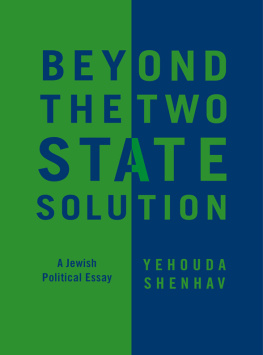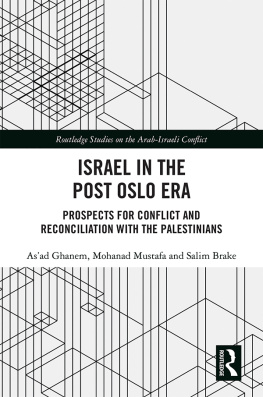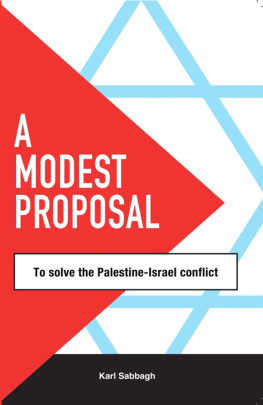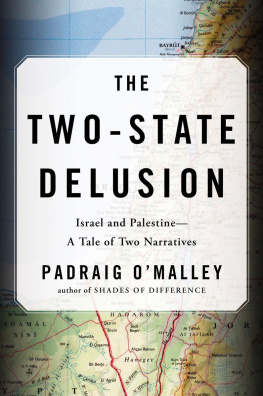BEYOND THE TWO-STATE SOLUTION
BEYOND THE TWO-STATE SOLUTION
A JEWISH POLITICAL ESSAY
YEHOUDA SHENHAV
polity
Copyright Yehouda Shenhav 2012
The right of Yehouda Shenhav to be identified as Author of this Work has been asserted in accordance with the UK Copyright, Designs and Patents Act 1988.
First published in 2012 by Polity Press
First published as  (Entrapped by the Green Line) in 2010 by
(Entrapped by the Green Line) in 2010 by  (Am Oved Press).
(Am Oved Press).
Polity Press
65 Bridge Street
Cambridge CB2 1UR, UK
Polity Press
350 Main Street
Malden, MA 02148, USA
All rights reserved. Except for the quotation of short passages for the purpose of criticism and review, no part of this publication may be reproduced, stored in a retrieval system, or transmitted, in any form or by any means, electronic, mechanical, photocopying, recording or otherwise, without the prior permission of the publisher.
ISBN: 978-0-7456-3294-7
A catalogue record for this book is available from the British Library.
The publisher has used its best endeavours to ensure that the URLs for external websites referred to in this book are correct and active at the time of going to press. However, the publisher has no responsibility for the websites and can make no guarantee that a site will remain live or that the content is or will remain appropriate.
Every effort has been made to trace all copyright holders, but if any have been inadvertently overlooked the publisher will be pleased to include any necessary credits in any subsequent reprint or edition.
For further information on Polity, visit our website: www.politybooks.com
FOREWORD: YEHOUDA SHENHAVS BEYOND THE TWO-STATE SOLUTION
In his book Beyond the Two-State Solution, Yehouda Shenhav makes an unusual and unsettling argument. It is an argument that targets the Israeli left in the English-speaking world and those who take their heed of them. Shenhav argues that what appears on its face a progressive position on the question of Israel and Palestine, is in fact censorial and duplicitous. The Israeli lefts sanctimonious insistence in the face of the Jewish settlers of the West Bank that the settlements were illegal and that the proper borders of Israel are those of 1967, is nothing short of an ideological maneuver. The purpose of the maneuver is to obfuscate the fact that Israel itself is nothing short of a huge settlement project that was founded upon the displacement of hundreds of thousands of Palestinians and the systematic expropriation of the land they left behind.
The ideological maneuver is accomplished, according to Shenhav, through a shift in terminology from The Green Line to The 1967 borders: The Green Line signified the borders Israel fell upon in 1949 following the 1948 war, but after the 1967 war when Israel occupied the West Bank and Gaza, these very same borders came to be called The 1967 borders. They were the same borders but they were now called something different. This transmutation in sign from Green Line to 1967 borders in the language of the left is premised on a moral distinction: the 1948 war and the outcome it yielded was legitimate not so with 1967 and the occupation/settlement in its aftermath.
The translation of Shenhavs book into English is a welcome intervention because it is not just the Israeli left that doesnt want to touch 1948. The Jewish left and its allies in the US also insist, often vociferously, on dating Israels injustice to 1967. Any Palestinian who has attempted to enter coalition politics with the progressive forces in the US on the question of Israel and Palestine feels the heavy-handed, almost authoritarian manner in which such moral distinctions are made. There is a demand by ones allies that one should forget 1948, that one should split ones own diasporic experience, ones uprooting, ones trajectory over time, so that it tracks that of the moral judgement of the Israeli left. Many of us Palestinians, who have attempted (and stubbornly refuse to despair of) such coalition politics, whether on the streets, in activist organizations, in media interventions, in academia as activist students or professors, have had the experience of stepping on someones toe by evoking 1948 the very hint of it, it would seem, causes a meltdown of sorts, a denunciatory rage, a charge that we have misunderstood our well-deserved and self-inflicted banishment, that we should just get on with the international (read Western) consensus, that the national(ist) division premised on theirs in 1948, ours in 1967, is a just and rightful one; in short, a demand that we should put up and shut up already about 1948.
In the academic literature in the US, the situation is just as dire, and the defense of the moral distinction as tight. In legal scholarship, for instance, the farthest to the left on the political spectrum one can get is a law review article that denounces Israeli occupation of the territories, declares the transfer of the occupiers nationals to the occupied territories as violating international law, and demands the dismantlement of the settlements and the return to the 1967 borders. Such an author might marvel at the Israeli occupations tenacity: an occupation that has stumped the International Law of Occupation with its duration, persistence and the legal adroitness and resourcefulness of its administrators and national apologists; and one that has, ironically enough, by transferring half a million of its own nationals into the occupied territories, proven itself absolutely correct in denying its an occupation.
From this position on the left, one can only move to the right. The progressive author insisting on withdrawal from territories occupied in 1967 is then dragged into a debate with the apologist for Israel. Such an apologist would insist that these territories could not be considered occupied in any legal sense since no legitimate sovereign authority controlled them when they were occupied by Israel in 1967. This was no-mans-land, according to the apologist, and therefore the rule prohibiting transfer of population doesnt apply. This was no mans land and therefore there was no rush for the Israeli authorities to leave. This was no-mans-land and therefore the humane and humanitarian standards limiting the conduct of the occupier vis--vis the occupied population do not apply, though the Israeli authorities could choose to follow them out of generosity, rather than by rule of law. The author might go as far as adopting the Israeli term Judea and Samaria in referring to the territories, thereby completing in sign what the author had made in argument.
Then there is the never-failing argument about security and terrorism, with reference to which everything from building a fence, to dismembering territory through checkpoints, to waging a war on Gaza, to passing a discriminatory legislation, to building yet another settlement, is justified a discourse that confuses cause and effect as Shenhav so rightly puts it.
From left to right, no robust political position exists in the US that would be based on the injustice of 1948. One can appreciate, in this light, the radical-ness of Shenhavs insistence on evoking politically the injustices of that year. It would seem by doing so he is pushing the left to be more left.
But Shenhav might not be too pleased with this characterization of the politics of his project. As you reach the last part of his book, you find that he aims at nothing less than confusing the political spectrum of left to right altogether on the issue of Israel/Palestine.
Shenhav doesnt just charge the Israeli left with selective morality (obscuring 1948 and highlighting 1967), he also contends that the move to settlements in the territories that the Israeli left finds so objectionable was in large part a convenient resolution of an ethnic/class conflict internal to Israel (among its Jewish population) that the ruling elites welcomed and in which their victims found comfort and respite. The Third Israel Mizrahim, ultra-orthodox Jews and poor Russians found migrating to settlements in the new land an escape from racism and marginality in Israel proper, and their racial superiors (the Ashkenazi) found in such migration an easy solution to the social and economic crisis that had intensified over the past three decades due to Israels adoption of neo-liberal economics. In fact, Shenhav stresses that the settlement project has been most profitable for the ruling elites of Israel the left being members of this class in the most convenient and self-serving ways. It has, on the one hand, allowed the elites to profit economically from building the settlements while waxing eloquent and nostalgic for an Israel that was morally unburdened by their existence. They have built walls and highways to protect the settlers while blaming them for obstructing the way to a two-state solution. They have provided military support for the settlers while decrying their increasing political influence in Israel.
Next page











 (Entrapped by the Green Line) in 2010 by
(Entrapped by the Green Line) in 2010 by